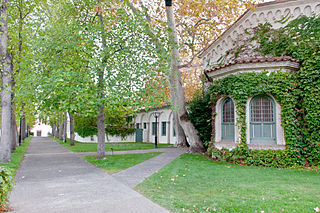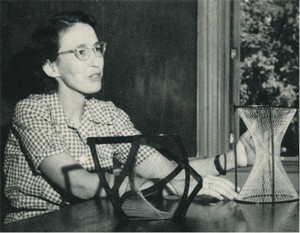Related Research Articles
Caroline Farrar Ware (1899–1990) was a professor of history and a New Deal activist. Her work focused on community development, consumer protection, industrial development, civil rights, and women's issues.

Women's colleges in the United States are private single-sex U.S. institutions of higher education that only admit female students. They are often liberal arts colleges. There are approximately 26 active women's colleges in the United States in 2024, down from a peak of 281 such colleges in the 1960s.

Christine Ladd-Franklin was an American psychologist, logician, and mathematician.
Alice Turner Schafer was an American mathematician. She was one of the founding members of the Association for Women in Mathematics in 1971.

Winifred "Tim" Alice Asprey was an American mathematician and computer scientist. She was one of only around 200 women to earn PhDs in mathematics from American universities during the 1940s, a period of women's underrepresentation in mathematics at this level. She was involved in developing the close contact between Vassar College and IBM that led to the establishment of the first computer science lab at Vassar.

Martha Euphemia Lofton Haynes was an American mathematician and educator. She was the first African American woman to earn a PhD in mathematics, which she earned from the Catholic University of America in 1943.
Charlotte Cynthia Barnum, mathematician and social activist, was the first woman to receive a Ph.D. in mathematics from Yale University.

Susan Jane Cunningham was an American mathematician instrumental in the founding and development of Swarthmore College. She was born in Maryland, and studied mathematics and astronomy with Maria Mitchell at Vassar College as a special student during 1866–67. She also studied those subjects during several summers at Harvard University, Princeton University, Newnham College, Cambridge, the Royal Observatory, Greenwich, and Williams College.
Grace Elizabeth Bates was an American mathematician and one of few women in the United States to be granted a Ph.D. in mathematics in the 1940s. She became an emeritus professor at Mount Holyoke College. Bates specialized in algebra and probability theory, and she co-authored two textbooks: The Real Number System and Modern Algebra, Second Course. Throughout her own education, Bates overcame obstructions to her pursuit of knowledge, opening the way for future women learners.
Ruth Gentry was a pioneering American woman mathematician during the late 19th century and the beginning of the 20th century. She was the first Indiana-born woman to acquire a PhD degree in mathematics, and most likely the first woman born in Indiana to receive a doctoral degree in any scientific discipline.
Deborah Tepper Haimo (1921–2007) was an American mathematician who became president of the Mathematical Association of America (MAA). Her research concerned "classical analysis, in particular, generalizations of the heat equation, special functions, and harmonic analysis".
Elizabeth Frances Cope, was an American mathematician who published on irregular differential equations. The Thorndike nomogram, a two-dimensional diagram of the Poisson distribution, is named for her.

Ruth Wendell Washburn was an American educational psychologist. She received a B.A. from Vassar in 1913, an M.A. from Radcliffe in 1922, and a Ph.D. degree from Yale University in 1929. The Ruth Washburn Cooperative Nursery School in Colorado Springs, Colorado is named in her honor.

Mary Graustein was a mathematician and university professor, and was the first woman to earn a doctorate in mathematics (1917) at Radcliffe College.

Eugenie Maria Morenus was an American mathematician and college professor and one of the few women to earn a PhD in math before World War II. She taught Latin and mathematics at Sweet Briar College from 1909 to 1946.

Mary Ethelwynn Rice Beckwith was an American mathematics educator. She held a PhD in economics from Radcliffe College, and taught for over forty years, at the Emma Willard School, Western Reserve University, Vassar College, and Milwaukee-Downer College.
Marie Johanna Weiss was an American mathematician, university professor and textbook author. In 1927, she became the first woman to earn a PhD in mathematics from Stanford University.
Abba Verbeck Newton was a pioneering American mathematician, one of the few women who earned a PhD in mathematics in the United States before the start of World War II.
Josephine Robinson Roe was an American mathematician and university professor. In 1918, she was the first woman to receive a doctorate in mathematics from Syracuse University, and one of the few American women to earn a PhD in mathematics before World War II.
References
- 1 2 Church, Phil (24 May 2002), "Nancy Cole", Mathematics History, Syracuse University, retrieved 2021-04-12
- 1 2 3 Green, Judy; LaDuke, Jeanne (2008), Pioneering Women in American Mathematics: The Pre-1940 PhD's, History of Mathematics, vol. 34 (1st ed.), American Mathematical Society, The London Mathematical Society, pp. 158–159, ISBN 978-0-8218-4376-5 ; see also extended biography on pp. 133–134 of the Supplementary Material at the AMS web site for the book.
- ↑ Nancy Cole at the Mathematics Genealogy Project
- ↑ Historic Fellows, American Association for the Advancement of Science, retrieved 2021-04-11